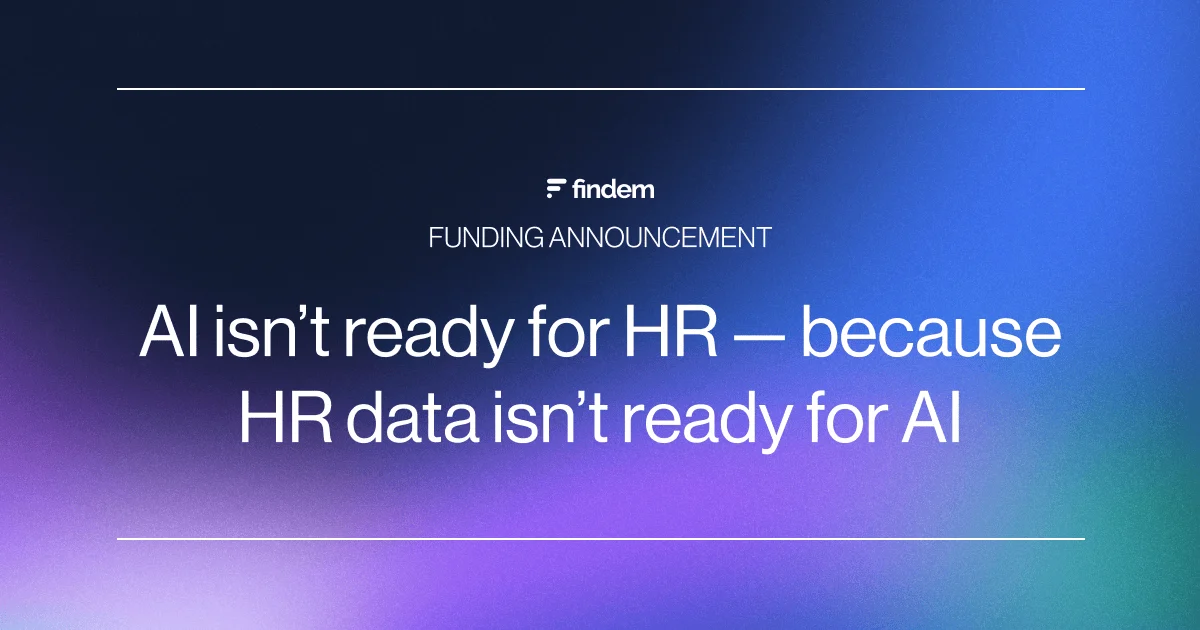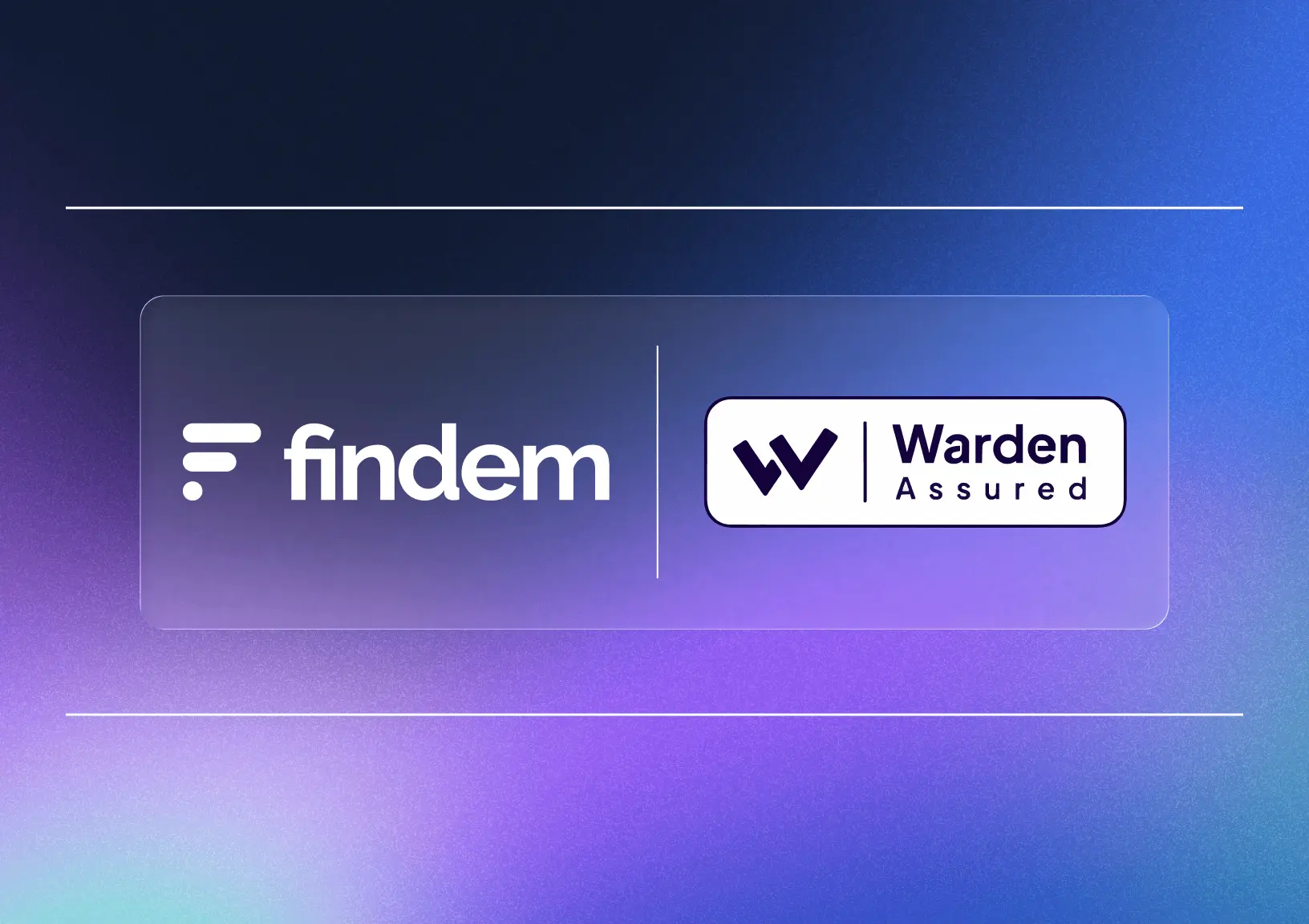.svg)
Why we raised Series C: AI isn’t ready for HR — because HR data isn’t ready for AI
.svg)

I’m excited to share that Findem, with monumental effort and commitment from our entire team, has raised $51 million in new funding, bringing our total to $105 million.
This round includes Series C equity led by SLW, with participation from Wing Ventures, Harmony Capital, and Four Rivers Group, alongside growth financing from J.P. Morgan
This raise comes on the back of significant momentum and growth of over 3x year-over-year.
Our founding thesis: Talent decisions are a data problem
Findem was founded on a simple but contrarian belief: Talent decisions aren’t an AI problem — they’re a data and business intelligence problem.
The most strategic people decisions depend on data quality, structure, and interpretation. Before AI can reimagine HR workflows, the underlying data has to match that ambition.
That’s truer today than ever. AI is proliferating across every function, reinventing traditional workflows and scaling judgment.
But when the data underneath is broken — unstructured, incomplete, inconsistent, and unverified — AI becomes performative instead of transformative.
And increasingly, teams rely on data that just isn’t unreliable, but AI-augmented on self-reported information, making it even harder to trust. Resumes and online signals are now often machine-written, optimized for algorithms rather than truth.
The real data that drives great people decisions is private, experiential, and deeply contextual. But it’s locked in the minds of the world’s best recruiters, hiring leaders, HR professionals, and managers.
They carry the judgment patterns that define what “great” looks like: how to evaluate a candidate’s potential, assess their fit, and predict their career trajectory. Until we capture and codify that expertise, AI in HR will continue to mirror the noise instead of learning from reality.
At Findem, we’re fixing that foundation by building the data infrastructure that makes AI credible in HR — labeling how real people decisions get made and transforming that expertise into machine-readable signals.
AI can’t automate judgment it doesn’t understand
Generic AI can write job descriptions or summarize resumes, but it can’t understand:
- Why a candidate thrived at a startup but stagnated in enterprise
- What “high potential” means in your specific culture
- How to evaluate performance from incomplete histories
Unlike a recruiter’s intuition, a manager’s pattern recognition, or an HR leader’s understanding of success, generic AI doesn’t understand context.
You could have a billion profiles in your database, but it’s not about the number. It’s about finding who’s right for your company. The volume is just noise, and more noise only creates bigger blind spots for the AI.
A frontend engineer who will thrive at Google isn’t the same as one who’ll succeed in a scrappy, high-velocity startup. The skillset might look identical on paper, but the signals — adaptability, autonomy, problem scope, tolerance for ambiguity — are completely different.
Only human judgment can teach AI to see those distinctions. Until that judgment is captured, structured, and labeled, AI will continue to automate tasks instead of improving outcomes.
The missing layer: An expert-labeling engine
To make HR data AI-ready, the world needs a new kind of infrastructure and a system that:
- Captures expert intuition: How people evaluate talent and define “fit”
- Labels real outcomes: Promotions, performance, retention, and impact
- Continuously learns: Adapts as new evidence emerges
That’s what Findem is building: the expert-labeling engine for HR.
We’ve built the world’s largest expert-labeled dataset for talent, transforming fragmented, human-generated data into validated Success Signals — patterns that reveal not just who can do the job, but who will thrive in the role.
As a faster, more explainable, and human-grounded foundation for AI-offloaded workflows, this dataset will open up space for new roles and strategic innovation on HR and talent teams.
Why this moment matters
Other industries have already had their AI inflection point. Law has models trained on legal contracts and engineering has copilots trained directly on code. But HR doesn’t, and that’s because people data has never been ready for AI.
Findem’s domain-specific AI changes that, making AI evidence-based, explainable, and trusted.
When AI learns from real human judgment — not public noise — it starts to mirror the way exceptional leaders, managers, and teams make decisions: with context, nuance, and depth.
Instead of automating tasks, sourcing faster, or finding cheaper workflows, we’re building AI that finally understands people the way great organizations do — by seeing the whole picture of a person: potential, values, and the conditions where they thrive.
That’s the leap that moves HR from automation to transformation, and from process to performance.
The future of AI in HR starts with data you can trust
Our Series C will help us:
- Expand our expert-labeled dataset across industries
- Advance our domain-specific AI for explainability and reliability
- Scale our partner ecosystem to codify recruiter and manager wisdom into usable data
True AI transformation in HR isn’t about automating what already exists, but about redefining the data layer AI learns from. That’s why we’re building the infrastructure that turns judgment into data, and data into trustworthy AI.
A personal note
When we started Findem, it was always about people (even if AI was always in the picture).
I’d watched world-class recruiters succeed despite their tools. They became the human API, holding together broken systems with experience and intuition. We set out to change that, scaling their expertise instead of replacing it.
Generic AI can autocomplete text, but it can’t explain why someone was promoted, why they stayed, or why they thrived. Recruiters, managers, and HR leaders can. And now, Findem’s AI can.
Domain-specific AI, built on expert-labeled data and Success Signals, raises that ceiling and gives leaders confidence that their AI is grounded in evidence, not proxies.
If you’re investing in AI for talent, the question isn’t whether AI matters, it’s which AI you can trust. Only models, which are trained on expert-labeled, human-verified data, will stand the test of time.
Thank you to our customers, partners, investors, and team. This milestone belongs to you.
Now, it’s back to building — the dataset, the model, and the trust that HR leaders need from AI.










